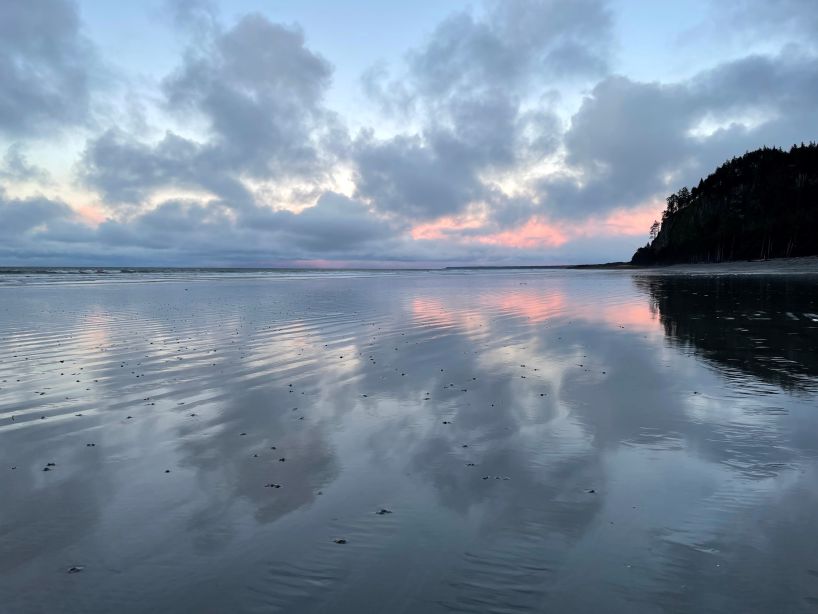Restorative justice is alive and well in Haida Gwaii

Haida Gwaii means “Islands of the People” in the Haida language. Located in the Pacific Ocean off the northwest coast of British Columbia, it is an isolated group of over 150 islands. Unique and stunningly beautiful, the islands are sometimes called “the Galápagos of the North.” To provide court services to the 5000 inhabitants of Haida Gwaii, a Provincial Court judge spends a week there ten times a year, holding court in two villages on Graham Island: Daajing Giids on the south coast and Masset on the north.
Judges David Patterson and Nina Purewal, resident judges in Prince Rupert, also sit in Haida Gwaii. They fly approximately 100 kilometres to Masset on the Monday of each court week in a small seaplane. Other court participants including justices of the peace, court clerks, sheriffs, Community Corrections officers, and Crown and defence lawyers also arrive by seaplane.
Court sittings are less predictable on Haida Gwaii than in BC’s larger centres. The weather off BC’s north coast can make getting to and from Graham Island a challenge. The seaplanes do not usually fly when winds are above 26 kilometres an hour or when there is thick low-lying fog. When flights are cancelled due to weather and the judge cannot make it to Haida Gwaii, they may preside by video-conference. When court staff also cannot fly, court sittings may have to be cancelled. When planes do fly, wind, fog, and rain can make the trip an adventure.
In October 2022, Allard School of Law student Ezra Rosas noted some other differences when he joined Judge Patterson and the court party in Haida Gwaii as part of his Provincial Court internship. He observed:
“The interaction between the community and the court system is certainly different. You may see someone in Court in the morning and then run into them at a food truck or at the coffee shop during lunch. The communities here are small and everyone knows each other. … I could tell that a lot of positive work is being done by defence counsel and the probation officer. …
It's clear that Judge Patterson takes the Supreme Court’s directives in R. v. Gladue and R. v. Ipeelee very seriously. I noticed that he is very proactive in applying those principles in the courtroom. Rehabilitation of the offender and restorative justice objectives were his main drive, and that was his primary consideration in sentencing.”
The Provincial Court generally assigns judges to circuit courts for extended periods to allow them to learn about local history, conditions, resources, and the people who appear in court. It allows the judges to dive deep into the reality of litigants’ lives and to apply informed restorative justice with local community involvement in appropriate criminal cases.
Restorative justice is alive and well in Haida Gwaii. As Judge Patterson expressed in his decision in R. v. Wright:
“…restorative justice is often understood as a non-adversarial and non-retributive approach to justice that focuses on addressing the harm caused by crime while holding the offender responsible for their actions. In theory, restorative justice allows the parties directly affected by the crime – victims, offenders and communities – to identify and address their needs in the aftermath of a crime. Restorative justice is based on the theory that crime is a violation of people and relationships. The principles of restorative justice are based on respect, compassion and inclusivity. Restorative justice encourages meaningful engagement and accountability and provides an opportunity for healing, reparation and reintegration.
Concerning Indigenous communities, restorative justice means ensuring that the offender’s sentencing reflects an understanding of the specific First Nations’ cultures, traditions, and hopes for the future. It also means addressing local issues by engaging with the local community.”
One of the ways that judges engage with the community and obtain that understanding in Haida Gwaii is to ask for input during sentencing hearings from elders, restorative justice workers, and representatives of the Haida Nation, Old Massett Band, or Skidegate Band, before deciding on a sentence or agreeing to the outcome of alternative measures.
On several occasions, Judge Patterson has been approached in the community by offenders, victims, or community members, and told how a sentence or alternative measure has changed the participants' lives for the better. He said, “I have shed tears listening to how the Court has improved or changed someone’s life by ensuring that the offender’s sentencing reflects an understanding of Haida culture, traditions, and the reality of people’s lives.”
Both Judges Patterson and Purewal have said how much they appreciate the welcome the Court receives from the Haida Nation and residents of Haida Gwaii. They are grateful for the contributions of circuit court staff, restorative justice workers, community advocates, and lawyers who are knowledgeable about community issues and enjoy their work in Haida Gwaii.
More information
R. v. Wright 2023 BCPC 143, paragraphs 77 and 78
R. v. Young, 2021 BCPC 6, affirmed 2021 BCCA 462 – a sentencing decision referring to the history and governance of the Haida people, see paragraphs 73 - 82
